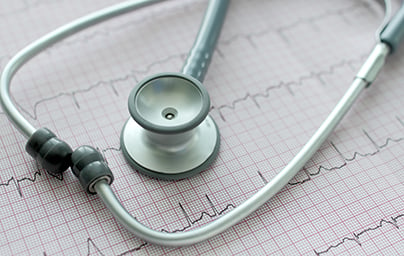Atrial fibrillation is one of the most common cardiac tachyarrhythmias (fast heart rhythm). Any damage to cardiac muscle tissue will affect the heart’s electrical pathways causing abnormal stimulation and contraction of heart muscles. Atrial fibrillation can cause a very fast, irregular heart rhythm. It can be classified as paroxysmal (episodes last more than 7 days), persistent (episodes fewer than 7 days that require medical or electrical intervention to terminate) or permanent (continues more than 1 year). Atrial fibrillation has been associated with an increased risk of stroke and increased mortality rate.

Atrial fibrillation is a common arrhythmia and its prevalence rate was estimated to be 2.7-6.1 million in 2010. This is expected to rise to 5.6-12 million by 2050.1 Its prevalence increases with age and with the presence of cardiovascular disease. In the Framingham Heart Study, the lifetime risk of developing atrial fibrillation was 1 in 4 for men and women ages 40 and above.2
Some patients may not experience any symptoms, however, others may experience palpitations, dizziness, fatigue, light-headedness, mild shortness of breath, increased urination, and anxiety. Many experience decreased exercise capacity. More severe symptoms include syncope, chest pain at rest, and worsening shortness of breath.
The most common causes are myocardial ischemia and infarction. Damage to the heart will cause dysfunction in how electricity travels through the heart muscle, leading to irregular contractions. Therefore, atrial fibrillation and coronary heart disease share similar risk factors, such as high blood pressure, high cholesterol, diabetes, obesity, inflammation, low nutrient diet, and smoking. Other causes include valvular heart disease; cardiac surgeries; medications; abnormal electrolytes, such as low magnesium and potassium; chronic renal disease; lung disease; pulmonary embolism; deep venous thrombosis; sleep apnea; hyperthyroidism; and alcohol use.
An exercise routine is essential in promoting cardiac health. Routines should be catered to the individual, as some patients may experience episodes of atrial fibrillation with aggressive exercise, so some limitations may be necessary.
Elimination of tobacco and alcohol in conjunction with a high nutrient diet will lower your risk of arrhythmias and can improve symptoms.
Though Coumadin or other blood thinners are typically prescribed to reduce the risk of a clot forming, a Nutritarian diet itself has anti-clotting effects and may offer adequate protection from clotting in lower risk patients without the risks of Coumadin. When taking Coumadin, green vegetable consumption may have to be regulated to lower levels that are maintained consistently to regulate the medication dose.
ONLINE: All members of DrFuhrman.com can search the Ask the Doctor archives for discussions on this topic. Platinum and Diamond members can connect with Dr. Fuhrman by posting questions in the forum. Not a member? Join now.
IN PERSON or ONLINE: Book a consultation with a specialist at Longevity Rx in San Diego, California, run by Joel Fuhrman, MD and Cara Fuhrman, ND. Using nutritional protocols, cutting-edge screening tools, advanced imaging, and innovative treatments for pain and injuries, they'll create a personalized action plan to help you prevent and recover from illness, and achieve your optimal weight. Book online at Longevity Rx or call +1 (858) 367-3558
EVENTS: Join Dr. Fuhrman for an online boot camp, detox or other event. During these immersive online events, you’ll attend zoom lectures, follow a special meal plan, and have access to a special, live Q&A session with Dr. Fuhrman. Learn more about events.
The following are sample questions from the Ask the Doctor Community Platinum and higher members can post their health questions directly to Dr. Fuhrman. (All members can browse questions and answers.)
I was just told that I have atrial fibrillation. How can nutritional excellence help? Do weight and diet have anything to do with this?
Of course, it has everything to do with weight and diet. It can be caused by atherosclerosis, high blood pressure, thyroid disease, as well as chemical stress from medications and other toxins.
The first step is to get back into excellent health. A Nutritarian diet can reverse atherosclerosis and aid in the removal of toxic metabolites and chemicals. I also recommend you eat walnuts, hemp, and chia seeds every day, as well as take a DHA/EPA supplement to assure the proper fatty acid levels.